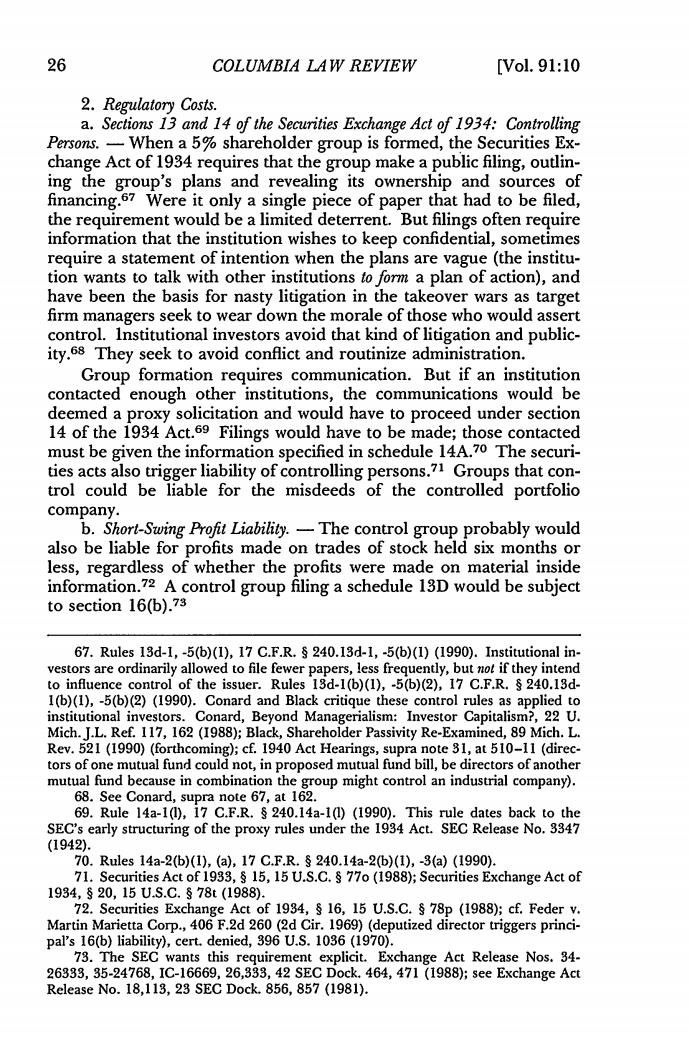正在加载图片...

26 COLUMBIA LAW REVIEW [Vol.91:10 2.Regulatory Costs a.Secti s 13 and change Act of 1934 requires that the group make a public filing,outlin- m the requ at would be a lin ted dete rrent. ng information that the in nstitution wishes to keep confidential, require a statement of intention when the plans are vague (the institu- tion wants to talk with other institutions to form a plan of action),and have been the basis for nasty litigation in the takeover wars as target firm managers seek to wear down the morale of those who would assert ntrol.Insti nal ir esto avoid that kir nd of lit nd public- ity.68 They seek to avoid conflict and routinize administration Group formation requires communication.But if an institution contacted enough other institutions,the communications would be deemed a p solicitation and would have to proceed under section 14 of the 1934 Act.69 Filings would h e to de.tho contacted must be given the information specified in schedule 14A.7 The securi- ties acts also trigger liability of controlling persons.71 Groups that con- trol could be liable for the misdeeds of the controlled portfolio company b.Short-Swing Profit Liability. also be liable for profits mad six month less,regardless of whether the profits were made on material inside information.72 A control group filing a schedule 13D would be subject to section 16(b).73 67.Rules 18d-1-5(b)(1).17 C.ER.s 240.13d-1.-5(b)(1)(1990).Institutional in vestors are ordinarily allo d to file fewer less fre but not if they intend to inffuence control of the issuer. Rule 13d-1(6)(1),56)(2), 17C.FR.S24 0.13d 1(b1,-5〔6 (2(1990).Conard and Bla critique these control rules 220 Mich.LL.Re 162 988):Black sh ssivity Re-Ex 89 Mich L Rev 521 (1990)(forthcom )cf.1940 Act Hearings note 81 at 510-11 (direc tors of one mutual fund could not,in proposed mutual fund bill,be directors of another mutu fund because in combination the oupmightcoodui) 69. Rule 40142.1m1990 This rule d tes hack to SEC's early structuring of the prox (1942). 1934 ,520,15U. 78t(198 9 xch of1934,s16,15U.s.C.s78p(1988):cf.Feder Martin Marietta Corp.,406 F.2d 260(2d Cir.1969)(deputized director triggers princi- pal's 16(b)liability),cert.denied,396 U.S.1036(1970). 633335a24682s52aa5685798hCOLUMBIA LAW REVIEW 2. Regulatory Costs. a. Sections 13 and 14 of the Securities Exchange Act of 1934: Controlling Persons. - When a 5% shareholder group is formed, the Securities Exchange Act of 1934 requires that the group make a public filing, outlining the group's plans and revealing its ownership and sources of financing.6 7 Were it only a single piece of paper that had to be filed, the requirement would be a limited deterrent. But filings often require information that the institution wishes to keep confidential, sometimes require a statement of intention when the plans are vague (the institution wants to talk with other institutions to form a plan of action), and have been the basis for nasty litigation in the takeover wars as target firm managers seek to wear down the morale of those who would assert control. Institutional investors avoid that kind of litigation and publicity.6 8 They seek to avoid conflict and routinize administration. Group formation requires communication. But if an institution contacted enough other institutions, the communications would be deemed a proxy solicitation and would have to proceed under section 14 of the 1934 Act.69 Filings would have to be made; those contacted must be given the information specified in schedule 14A. 70 The securities acts also trigger liability of controlling persons. 71 Groups that control could be liable for the misdeeds of the controlled portfolio company. b. Short-Swing Profit Liability. - The control group probably would also be liable for profits made on trades of stock held six months or less, regardless of whether the profits were made on material inside information. 72 A control group filing a schedule 13D would be subject to section 16(b). 73 67. Rules 13d-1, -5(b)(1), 17 C.F.R. § 240.13d-1, -5(b)(1) (1990). Institutional investors are ordinarily allowed to file fewer papers, less frequently, but not if they intend to influence control of the issuer. Rules 13d-l(b)(1), -5(b)(2), 17 C.F.R. § 240.13dl(b)(1), -5(b)(2) (1990). Conard and Black critique these control rules as applied to institutional investors. Conard, Beyond Managerialism: Investor Capitalism?, 22 U. Mich.J.L. Ref. 117, 162 (1988); Black, Shareholder Passivity Re-Examined, 89 Mich. L. Rev. 521 (1990) (forthcoming); cf. 1940 Act Hearings, supra note 31, at 510-11 (directors of one mutual fund could not, in proposed mutual fund bill, be directors of another mutual fund because in combination the group might control an industrial company). 68. See Conard, supra note 67, at 162. 69. Rule 14a-1(1), 17 C.F.R. § 240.14a-1(1) (1990). This rule dates back to the SEC's early structuring of the proxy rules under the 1934 Act. SEC Release No. 3347 (1942). 70. Rules 14a-2(b)(1), (a), 17 C.F.R. § 240.14a-2(b)(1), -3(a) (1990). 71. Securities Act of 1933, § 15, 15 U.S.C. § 77o (1988); Securities Exchange Act of 1934, § 20, 15 U.S.C. § 78t (1988). 72. Securities Exchange Act of 1934, § 16, 15 U.S.C. § 78p (1988); cf. Feder v. Martin Marietta Corp., 406 F.2d 260 (2d Cir. 1969) (deputized director triggers principal's 16(b) liability), cert. denied, 396 U.S. 1036 (1970). 73. The SEC wants this requirement explicit. Exchange Act Release Nos. 34- 26333, 35-24768, IC-16669, 26,333, 42 SEC Dock. 464, 471 (1988); see Exchange Act Release No. 18,113, 23 SEC Dock. 856, 857 (1981). [Vol. 91:10